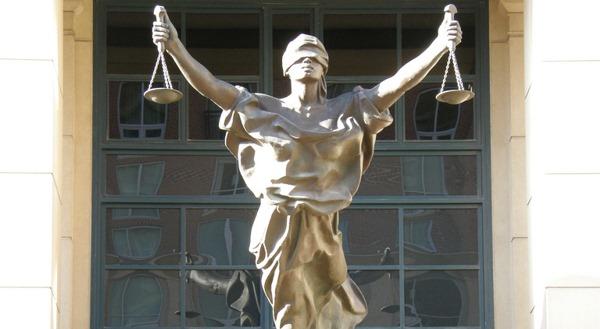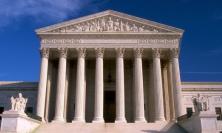The current controversy about the appointment of a replacement for the late Supreme Court Justice Antonin Scalia is indicative of wider problems associated with rights-based citizenship and the politicisation of the judiciary, writes Patrick Riordan SJ – and not just in the United States. How can legal and judicial systems best serve the common good?
The death of American Supreme Court Justice Antonin Scalia has provoked a heated debate about how and when an appointment of his replacement should be made. The United States Constitution provides that the president nominates Justices of the Supreme Court but their appointment is subject to confirmation by the Senate, which holds hearings for such purpose. Justice Scalia tended to be more conservative, resisting the tendency of some judges on the bench to adapt the Constitution to modern circumstances, for instance accepting the legality of same-sex marriage. Republicans who favour such social conservatism are fearful that President Obama will appoint a more liberal successor who could potentially block the implementation of policies by an incoming Republican president, hence the demand that the task of appointing a successor be left to the next president who will take office in early 2017. The demand itself reflects the understanding that the position of a Supreme Court judge, while nominally above party politics, is actually highly political. With such political significance riding on the appointment it becomes clear that the independence of the judiciary in that system is a qualified independence.
There are precedents in American history for this latest dispute. Thomas Jefferson, who had many misgivings about the Constitution of the United States when it was first drafted, voiced a very particular objection to the creation of a Supreme Court as final arbiter on the interpretation of the Constitution: in his view, the judiciary was the least democratic of the three powers of government. The executive was democratic, in that the president was to be elected via the selection of delegates from the various states; the legislature, comprising the two houses of Congress, was also democratic, as it would be directly responsive to constituents and vulnerable to rejection in subsequent elections. Alone among the three powers, the judiciary was to be removed from direct democratic accountability. Jefferson saw this as a deficit.
His views were not purely academic. When he succeeded John Adams to the presidency in 1801 he was furious to find that Adams, as outgoing president, had appointed a Chief Justice of the Supreme Court, John Marshall, who was not at all to Jefferson’s liking.[1] Marshall turned out to be a forceful Chief Justice who put his stamp on the office and brought an element of stability to the young republic though a period of turmoil. In later years, looking back on his career as president and on his relationship with Adams, Jefferson expressed resentment that this judge had been deliberately appointed to act as a constraint on the policies that he, as president, was likely to pursue.[2] In the light of this complexity the cynic might wonder if Jefferson’s criticism of the Supreme Court – that, not being responsive to the will of the people, it was insufficiently democratic – simply masked his objection to any institution or officer that was likely to oppose his policies. There is no mask worn in the present debate: each party wants to secure control of the bench, insofar as that is possible, and the Republicans’ anxieties are about what Barack Obama might do to thwart the political agenda of a possible Republican president.
The politicisation of the Supreme Court both reflects and contributes to a changing understanding of the nature of citizenship and participation in politics in America. Michael Schudson has studied the development of citizenship throughout the history of the United States and comments on the shift from political to legal conduct of conflict.[3] Instead of campaigning politically to bring about a change in the law through the legislature, interest groups now seek to attain their ends via a Supreme Court ruling which either overturns a piece of legislation as unconstitutional, or places conditions on possible interpretations of the law so as to exclude or include various practices. The disputes before the courts have replaced in many cases the debates which ought to be conducted in Congress and in political campaigning, as candidates or elected representatives strive to achieve popular support for their proposals. This burdensome pathway is short-circuited if one can obtain a Supreme Court ruling in favour of the espoused agenda. Important decisions have been made in this manner, such as the notorious 1973 Roe vs Wade judgment which ruled all existing states’ laws criminalising abortion to be unconstitutional.[4] The core of Justice Blackmun’s argument in favour of decriminalising abortion was an appeal to a right to privacy, which he and the majority on the bench claimed to find in the Constitution. The right to privacy was interpreted as entailing a woman’s right to have an abortion, which the states’ laws were obliged to respect. Mr Justice White, in his dissenting opinion, called the Court’s decision an ‘exercise of raw judicial power’.
A consequence of the predominance of the legal rhetoric of rights is that many disputes which ought to be conducted in the public and political forum are referred to the courts for resolution. The citizen has come to be seen as a rights holder, with the accompanying phenomenon that the law courts are as much an arena for citizens and lobby groups to pursue their goals as are local and national institutions of legislation and government. Legal decisions replace politically won compromise. To some extent this has occurred with the connivance of politicians, who have been content to pass the responsibility for unpopular or controversial decisions to judges. The result, however, is that the political forum is emasculated. If the courts are being asked to adjudicate essentially political matters, then it makes sense for the politically interested parties to ensure that their interests are well represented on the benches of judges. Appointments of judges are politically contended. And so we have the present dispute.
For many observers, the political nature of judicial appointments is an affront to justice. It seems to deny the values expressed in the oath to do justice according to law and in such images as the statue of the blindfolded Justitia, weighing causes in her scales without regard to persons. In what sense can a justice that is so vulnerable to political influence be justice at all? This thought reminded me of what I had learned in Catechism class in school. There we were required to consider the question: why should there be a General Judgment?
A. A general judgment is required in order that the providence of God, which sometimes permits the good to suffer and the wicked to prosper in this life, may appear just before all men.[5]
The Catechism of the Catholic Church teaches the same doctrine: ‘The Last Judgment will reveal that God’s justice triumphs over all the injustices committed by his creatures and that God’s love is stronger than death.’[6] It is noticeable, however, that the newer formulation does not evoke that sense of frustration at divine Providence, which the poet Gerard Manley Hopkins expresses so clearly, echoing the Prophet Jeremiah who also railed at God:
Thou art indeed just, Lord, if I contendWith thee; but, sir, so what I plead is just.Why do sinners’ ways prosper, and why mustDisappointment all I endeavour end?[7]Behind the formulation of my school Catechism lies a perennial element of human experience. Despite the hunger and thirst for justice in our hearts it nonetheless remains the case that justice is not achieved, and even our best efforts to do justice through the human instruments of law and courts of justice often fail in the attempt. It can even happen that our best efforts actually result in harm to innocent persons and damage to important goods. Augustine formulated the dilemma already in the fifth century in his great collection of books The City of God.[8] Given the inevitability of getting it wrong and doing more harm than good, he asked why any good person would consent to exercise the office of judge in a human court of law, and sit in judgment on her fellow human beings? The practices of the law in Augustine’s day were very different to ours, relying as they did on the physical torture of witnesses to ensure they were telling the truth. We don’t rely on physical torture, but cross examination by barristers in court can be a form of psychological torture. Recall the horror at seeing the intrusive questioning of Milly Dowler’s parents in the trial of the man accused of her murder. Recall the reluctance of victims of rape to follow up with a prosecution of their violator, because they expect to be subjected to a virtual repeat of the violation in the process of cross examination oriented to casting doubt on their veracity and integrity. Our human attempts to do justice are always flawed and frequently result in harm and pain to innocent people, whether victims of crime, witnesses or the wrongly accused.
Despite our best efforts to create systems of law and justice we never seem to be able to get it completely right. It is not only in the USA that people find cause to wonder about the adequacy of our legal instruments for doing justice. In the United Kingdom many of our politicians now object to the jurisdiction of the European Court of Human Rights, and view the Court’s decisions to uphold human rights as unwarranted intrusions on the sovereignty of the British Government. The American experience shows that there may well be good grounds for querying the predominance of rights rhetoric in the law, even if we baulk at the idea of refusing to uphold human rights.
The changing understanding of the roles of the citizen and of the judiciary provokes some important questions about the predominance of the rhetoric of rights. Does the emphasis on the rights of the individual, and the corresponding expectation that those rights are to be delivered by judicial action, distort our political and social discourse and our responsibility for the common good? Michael Schudson asks the following questions about the contemporary emphasis on rights:
Does it guide people to (1) commit themselves to dialogue and deliberation with fellow citizens recognized as moral and political equals (2) while keeping minority rights in mind and (3) holding in view not only themselves but their posterity, while also (4) demanding of themselves, in everyday circumstances, ordinary but not heroic efforts at information-gathering and civic participation? … Or, instead, does it reduce citizenship to a what’s-in-it-for-me relationship to public life? Does it provide new tools and new access primarily for the people whose wealth and position gave them a disproportionately large say in governing in the first place?[9]
These and similar questions help us ensure that the system of justice on which we rely, predicated on individuals’ rights, actually serves the common good and the doing of justice. They are pertinent questions in the UK in the context of the growing relevance of human rights legislation and developing jurisprudence. But however they are answered, and whatever checks and balances we manage to put in place, we should not be surprised if deficiencies nonetheless appear and we continue to express frustration that ‘the innocent suffer and the wicked prosper’. This is no counsel of despair, however; as Augustine reminds us with his answer to the question posed, whether a good person can take on the responsibility for doing justice according to the letter and spirit and instruments of human law with the awareness of inevitable frustration and failure:
In view of this darkness that attends the life of human society, will our wise man take his seat on the judge’s bench, or will he not have the heart to do so? Obviously, he will sit; for the claims of human society constrain him and draw him to this duty; and it is unthinkable to him that he should shirk it.
Patrick Riordan SJ is a member of the Heythrop Institute: Religion and Society.
[1] David McCullough, John Adams (New York: The Free Press, 2001), p. 560.
[2] Joseph J. Ellis, Founding Brothers. The Revolutionary Generation (New York: Random House, 2000), p. 208.
[3] Michael Schudson, The Good Citizen: A History of American Civic Life (New York: The Free Press, 1998).
[4] John T. Noonan, A Private Choice. Abortion in America in the Seventies (New York: The Free Press, 1979).
[5] The Maynooth Catechism (1951), now available online: https://lxoa.files.wordpress.com/2010/08/maynoothcatechism.pdf
[6] Catechism of the Catholic Church, §1040.
[7] Gerard Manley Hopkins, ‘Thou art indeed just, Lord, if I contend’
[8] Augustine, The City of God, Edited by David Knowles (Harmondsworth: Penguin, 1972), Bk 19, c.6.
[9] Schudson, p. 309.






